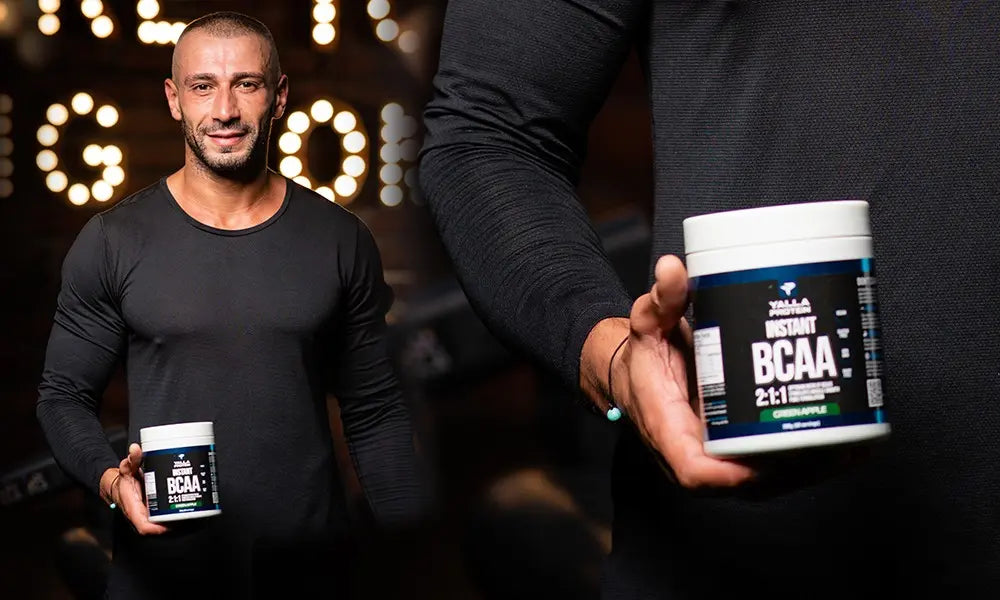BCAA And HMB

During hard training, your body obviously needs as much energy as it can possibly get. There will be no optimising performance without first optimising energy availability. With this in mind, many of us look for extra energy by supplementating carefully. Branched Chain Amino Acids (BCAAs) and HMB supplements fulfil this role for a lot of people (either taken together or separately).
HMB is a metabolite of the BCAA leucine (an essential amino acid, alongside isoleucine and valine, that the body cannot produce). Leucine is generally the most useful of the BCAAs.
HMB: A Brief History
Our bodies make HMB naturally from the amino acid leucine.
Leucine has been known as a powerful nutritional supplement for increasing strength, aiding hypertrophy, and helping with fat loss. It’s also been used for years as a well-known supplement to prevent muscle fatigue and DOMS.
Because of this, it got a reputation at one point for being able to slow breakdown of muscle proteins (or proteolysis). However, in reality it’s HMB derived from leucine that slows this protein breakdown.
The combination of benefits that leucine and HMB both bring to the table can dramatically enhance both your workouts and your body composition over time.
HMB has been getting steadily cheaper since the 90’s and reports from athletes who have used it for a mixture of purposes- whilst bulking, cutting, maintaining muscle, and even whilst competing, are pretty positive.
If you are already an athlete or thinking about getting into intense, short-burst, power sports like weightlifting, bodybuilding, boxing, sprinting and so forth, HMB might well be worth looking into.
It will complement the more common lean mass builders like creatine, protein powder, and, of course, BCAAs, very nicely. It can help to preserve your muscle mass and prevent muscle breakdown, whether through hard training or the maintenance of a caloric deficit during a cut.
HMB, alone or in conjunction with other supplements, might just be the thing that takes you to the next level.
HMB and BCAA
Leucine needs to be present to produce HMB naturally. It is a BCAA, which are often either used in conjunction with, or more commonly used instead of, HMB. But what are the different benefits that each supplement brings to the table individually?
Benefits of BCAAs
Branched chain amino acids are essential amino acids. This means that the body must take them in exogenously through the food in its diet. Animal products such as meat, fish and eggs will generally provide us with ample BCAAs, especially cuts of meat taken from skeletal or near-skeletal muscle.
Alternatively, of course, we can do so by taking BCAA supplements. This will be especially crucial during a cut or caloric deficit, when we aren’t taking in as many of the above foodstuffs as usual. As BCAAs help to support your workouts, it is obviously beneficial to take in as many as needed.
BCAAs are a rapidly metabolising supplement that enter your bloodstream directly to release and supply you with the branched chain amino acids (leucine, isoleucine and valine) needed for a solid, high-energy workout. These will both buffer protein intake as an energy source and that used for synthesis; protein synthesis must exceed protein breakdown for muscle growth.
If you are looking to boost BCAA levels, Yalla Protein's Instant BCAA 2:1:1 should be your first port-of-call and will represent a good pre-, post-, or mid-workout supplement. Compared to other market leader's (such as Xtend BCAA's), there are not unnecessary additives and a high percentage of BCAA's.
Using a product like Yalla Protein's Instant BCAA 2:1:1 will mean that you will never be short of leucine. Use it in conjunction with Yalla Protein HMB to maximise energy levels and hypertrophy efficiency.
Benefits of HMB
As mentioned, HMB is a by-product from a portion of leucine, the essential amino acid. It is naturally produced in the body in the presence of leucine. However, whilst HMB can be produced in the body, some athletes prefer to use supplements to support their training.
Why would they do this?
There is one main reason; supplementing HMB takes away your body’s reliance on leucine for production. This means that HMB levels won’t be limited by a third-party factor. This may be especially useful for vegetarians and those following a plant-based diet, as they will naturally have a deficit of leucine.
Other than this, simple volume is key; taking HMB supplements will put more HMB into your system, thus giving you greater results than if you were lacking it.

